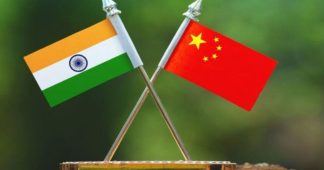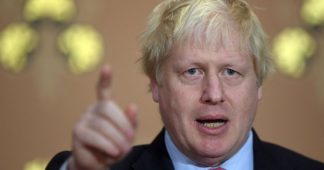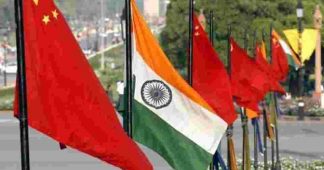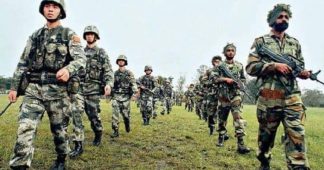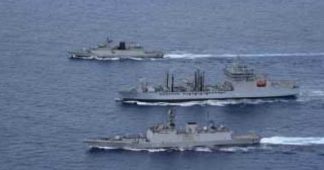By Raj Kumar Sharma
Mar 25, 2022
It is clear that there are no easy choices for India in the New Cold War and it would want to avoid a scenario where China has the last laugh. A weak and isolated Russia is not in India’s interests and New Delhi will make efforts to help its traditional friend in its hour of need, writes Raj Kumar Sharma, Post-Doc Fellow, Delhi School of Transnational Affairs, University of Delhi.
The ongoing Russia-Ukraine conflict is one of the few foreign conflicts that have captured public memory in India. For the government of India, it has proven to be a diplomatic minefield as New Delhi tries to carefully tread the fine line between Russia and the Western countries in order to safeguard its own national interest. Russia, expectedly, has come under severe criticism from the US and the European countries.
Unlike its strategic partners in the West, India did not condemn and refrained from using the word ‘invasion’ to describe Russia’s actions in Ukraine. New Delhi also abstained from the UN Security Council and UN Human Rights vote on the issue while it also abstained from the UN General Assembly resolution criticising Russia. India is already working to circumvent Western sanctions on Russia to protect its interests like energy and military cooperation.
Many Western governments, their press and think-tank circles have criticised India for not doing anything to isolate Russia in international politics. Such a view not only omits West’s double standards on Yugoslavia (1999), Iraq (2003) and Libya (2011) but also lacks sensitivity towards India’s strategic concerns in which Russia helps India to balance China through diplomatic and military means. There is a domestic debate ongoing in India as well. Some experts believe India should stand with the West against Russia and make efforts to weaken its dependence on Moscow. Others have cited India’s good political relations with Russia and stressed the need to stay away from the New Cold War between Russia and the West. Neither India can prevent this structural change in international politics nor can it shape the US-Russia relations. Hence, it may be a better option to steer clear of this rivalry but it would not be easy. Unlike some of the Western commentaries which cite military dependence as the sole factor, India’s stand on the Ukraine crisis is quite layered and complex that also has other important factors involved.
First, India shares a disputed border with China and a border standoff is ongoing between the two Asian giants in high Himalayas. To maintain balance of power in the Eurasian region through diplomatic and military means, Moscow has been supplying critical military hardware to India and is the only country to have made attempts to diffuse tensions between India and China by facilitating contact and interaction between their leaders over the past year. India could not have ignored China’s stand on the Ukraine situation as Beijing too chose not to condemn Moscow. India’s traditional rival, Pakistan has also resisted Western pressure to isolate Russia. India wants to avoid a Russia-China-Pakistan axis that could further complicate its security interests. This is also in sync with the spirit of India’s membership in forums like RIC, BRICS and SCO.
Second, historical memory in India and Russia with regards to the days of former ‘Empire’ and their current neighbourhood is similar. Pakistan was created after the British Empire decolonised in 1947. Similarly, Ukraine became independent after disintegration of Soviet Union in 1991. During the Cold War, Pakistan’s alliance with the US had created security problems for India. The current China-Pakistan nexus also has security implications for India. In the same way, Russia has had historical apprehensions about NATO’s role in its neighbourhood and former Soviet republics becoming NATO members crosses Russia’s security threshold. Although India and Russia profess multi-polarity at the global level, they aspire to maintain their regional primacy. Some of these sentiments were indirectly expressed when Foreign Minister S Jaishankar had said in Paris that the situation in Ukraine was about post-Soviet politics, NATO’s expansion and troubled history between Russia and the West.
Third, despite India’s deepening ties with the US, India continues to depend on Russia for military hardware. Contrary to the oft cited figure of 60-70 percent, a study by Stimson Centre, US found in 2021 that India’s dependence on Russia for arms supplies is as high as 85 percent. Indian military facing China on its northern borders depends on Russia for critical supplies and antagonising Moscow at such a juncture remains impossible. The military-technical cooperation between India and Russia remains ahead of what is or may be there between India and the US. It is not long ago that the US decided to supply its sophisticated nuclear technology to its other fellow Quad member, Australia while India was overlooked raising some questions over Quad and its future among some Indian experts. America’s propensity to uphold values and principles in global politics has declined over the years. In India’s vicinity, the US abruptly ended its military campaign in Afghanistan last year and handed over Afghanistan to Pakistan. The US had no qualms in negotiating a deal with the Taliban sacrificing values like human rights, women empowerment, democracy and pluralism showcasing the plight of the Western liberal order. Reliability is still a factor that remains uncertain in India-US ties despite their deepening relationship.
Lastly, evacuation of almost 20,000 Indian students initially stranded amidst the Ukrainian battlefield was the main priority of the Modi administration. The previous experience suggests that cooperation is needed from all parties involved in the conflict to carry out a successful evacuation operation. Some media outlets in India have also highlighted Ukraine’s insensitivity towards India’s security concerns like its considerable defence ties with Pakistan and its negative role in the UNSC after India’s nuclear tests in 1998. However, this is unlikely to have been a factor in India’s stand on Russia-Ukraine conflict as Ukraine is also involved in defence deals with India like gas turbine engines for frigates and upgrading Indian Air Force’s transport helicopters.
Despite their existence, the differences between India and Russia on the issue have not found much space in public domain. During his phone call with President Putin, Prime Minister Modi had conveyed his concerns highlighting need to respect territorial sovereignty and integrity of other nations. For sure, India would not recognise the two breakaway regions of Ukraine, Donetsk and Luhansk whom Russia has recognised as independent. It is because India does not support right to secede away from a country based on self-determination as it goes against its Kashmir policy. Consistent with this policy, India has not recognised Kosovo, South Ossetia and Abkhazia as independent countries. On March 2, India’s permanent representative to the UN reminded Russia that all states should follow the UN Charter and respect territorial sovereignty and integrity of other states. This statement is different from the one India made in January end where New Delhi talked of ‘legitimate security interests’ of all sides. This change is India’s effort to strike a neutral position in the current conflict between the West and Russia to safeguard its interests in the Quad and Indo-Pacific aiming to balance China. From India’s point of view, initiatives like the Quad and Indo-Pacific are not directed against Russia and New Delhi has been quite vocal in getting Moscow involved in its Indo-Pacific vision.
Differences do exist between India and Russia on the ongoing situation in Ukraine but that has been the nature of India-Russia relationship since decades where difference of opinion has not impacted their bilateral ties. In line with the Realist perspective, India has tried to safeguard its national interest in this situation. As India’s former Foreign Secretary Shyam Saran has rightly pointed out, India would face a nightmare if the US decides to have a strategic accommodation with China (G-2) citing Russia as a bigger threat. It is clear that there are no easy choices for India in the New Cold War and it would want to avoid a scenario where China has the last laugh. A weak and isolated Russia is not in India’s interests and New Delhi will make efforts to help its traditional friend in its hour of need.
Continue reading at valdaiclub.com
We remind our readers that publication of articles on our site does not mean that we agree with what is written. Our policy is to publish anything which we consider of interest, so as to assist our readers in forming their opinions. Sometimes we even publish articles with which we totally disagree, since we believe it is important for our readers to be informed on as wide a spectrum of views as possible.
